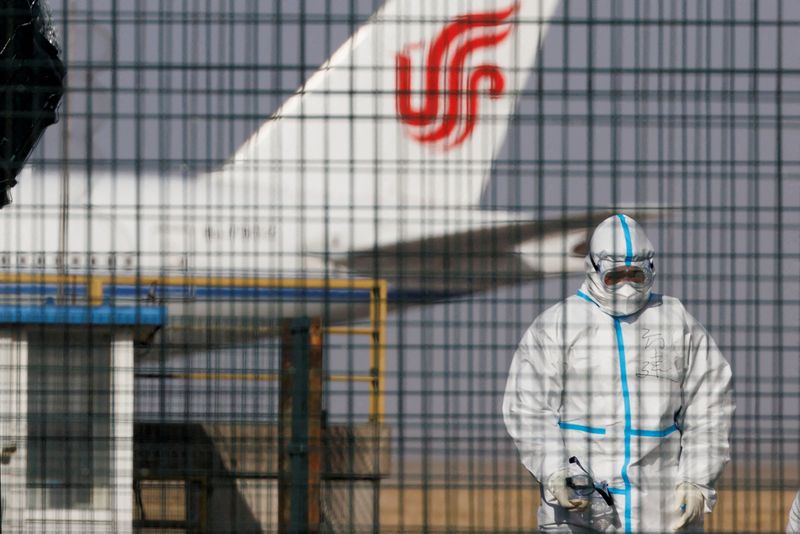By Bernard Orr and Eduardo Baptista
BEIJING (Reuters) - People in China worried on Thursday about spreading COVID-19 to aged relatives as they planned returns to their home towns for holidays that the World Health Organization warns could inflame a raging outbreak.
The Lunar New Year holiday, which officially starts on Jan. 21, comes after China last month abandoned a strict anti-virus regime of mass lockdowns that prompted widespread frustration and boiled over into historic protests.
That abrupt U-turn unleashed COVID on a population of 1.4 billion which lacks natural immunity, having been shielded from the virus since it first erupted in late 2019, and includes many elderly who are not fully vaccinated.
The outbreak spreading from China's mega-cities to rural areas with weaker medical resources is overwhelming some hospitals and crematoriums.
With scant official data from China, the WHO on Wednesday said it would be challenging to manage the virus over a holiday period considered the world's largest annual migration of people.
Other warnings from top Chinese health experts for people to avoid aged relatives during the holidays shot to the most-read item on China's Twitter-like Weibo (NASDAQ:WB) on Thursday.
"This is a very pertinent suggestion, return to the home town ... or put the health of the elderly first," wrote one user. Another user said they did not dare visit their grandmother and would leave gifts for her on the doorstep.
"This is almost the New Year and I'm afraid that she will be lonely," the user wrote.
More than two billion trips are expected across China over the broader Lunar New Year period, which started on Jan. 7 and runs for 40 days, according to the transport ministry. That is double last year's trips and 70% of those seen in 2019 before the pandemic emerged in the central Chinese city of Wuhan.
"I will stay at home and avoid going to very crowded places," said Chen, a 27-year-old documentary filmmaker in Beijing who plans to visit her home town in the eastern province of Zhejiang.
Chen said she would disinfect her hands before meeting elderly relatives, such as her grandmother, who has managed to avoid infection.
LACK OF DATA CRITICISED
The WHO and foreign governments have criticised China for not being forthright about the scale and severity of its outbreak, which has led several countries to impose restrictions on Chinese travellers.
China has been reporting five or fewer deaths a day over the past month, numbers that are inconsistent with the long queues seen at funeral homes. The country did not report COVID deaths data on Tuesday and Wednesday.
Liang Wannian, the head of a COVID expert panel under the national health authority, told reporters that deaths could only be accurately counted after the pandemic was over.
Although international health experts have predicted at least a million COVID-related deaths this year, China has reported just over 5,000 since the pandemic began, a fraction of what other countries have reported as they removed restrictions.
Looking beyond the death toll, investors are betting that China's reopening will reinvigorate a $17 trillion economy suffering its lowest growth in nearly half a century.
That has lifted Asian stocks to a seven-month peak, strengthened China's yuan currency against the U.S. dollar and bolstered global oil prices on hopes of fresh demand from the world's top importer.
China's growth is likely to rebound to 4.9% in 2023, according to a Reuters poll of economists released on Thursday. GDP likely grew just 2.8% in 2022 as lockdowns weighed on activity and confidence, according to the poll, braking sharply from 8.4% growth in 2021.
TRAVEL CHALLENGES
After three years of isolation from the outside world, China on Sunday dropped quarantine mandates for inbound visitors in a move expected to eventually also stimulate outbound travel.
But concerns about China's outbreak has prompted more than a dozen countries to demand negative COVID test results from people arriving from China.
Among them, South Korea and Japan have also limited flights and require tests on arrival, with passengers showing up as positive being sent to quarantine.
In a deepening spat between the regional rivals, China has in turn stopped issuing short-term visas and suspended transit visa exemptions for South Korean and Japanese nationals.
Despite Beijing's lifting of travel curbs, outbound flight bookings from China were at only 15% of pre-pandemic levels in the week after the country announced it would reopen its borders, travel data firm ForwardKeys said on Thursday.

Low airline capacity, high air fares, new pre-flight COVID-19 testing requirements by many countries and a backlog of passport and visa applications pose challenges as the industry looks to recovery, ForwardKeys Vice President Insights Olivier Ponti said in a statement.
Hong Kong Airlines on Thursday said it does not expect to return to capacity until mid-2024.